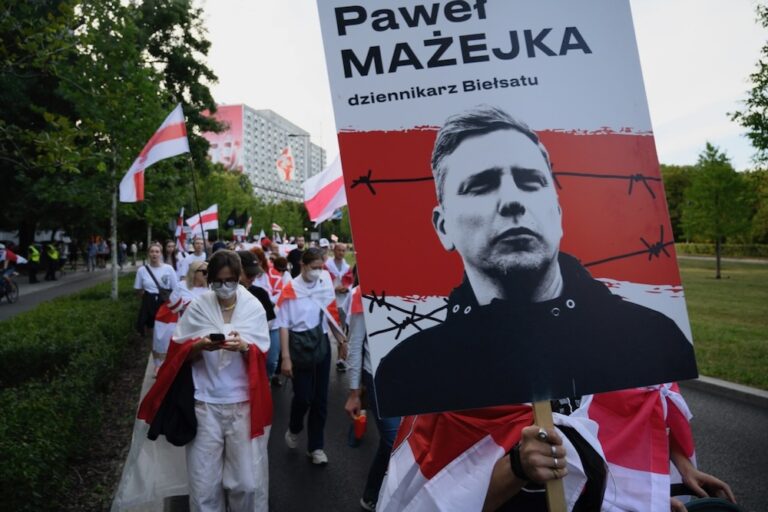Press freedom groups point to "a disconnect between the report’s findings and on-the-ground realities".
This statement was originally published on europeanjournalists.org on 14 June 2024.
The European Federation of Journalists (EFJ) joins the undersigned organizations in welcoming the recent study on the actions taken by Member States to implement the European Commission’s Recommendation on the protection and safety of journalists. However, our coalition finds that the report lacks a critical assessment of on-the-ground realities that reduce the effectiveness of initiatives that otherwise look good on paper. We stress therefore the need for more effective measures, and a deeper engagement with journalists and media freedom organizations, to build structures that can genuinely safeguard journalist safety in Europe.
The Media Freedom Rapid Response (MFRR) coalition reviewed the recently published Study on putting in practice by Member States of the Recommendation on the protection, safety, and empowerment of journalists, commissioned by the European Commission and executed by Intellera Consulting, Open Evidence, and PricewaterhouseCoopers (PwC).
We welcome the report and efforts to monitor the record of Member States, in view of the persisting challenges to journalist safety. Nevertheless, given that the study presents an ostensibly positive view on the implementation of the 2021 Commission’s Recommendation 2021/1534, our coalition finds the report insufficiently reflects the real challenges faced by journalists and the overall failure of governments to guarantee a safe environment for media.
There is a disconnect between the report’s findings and on-the-ground realities created, in part, by a lack of effective political action for journalist protection.
Persistent hurdles to journalist safety: a reality check
According to the report, most EU Member states “show progress” in implementing the Recommendation, with 19 out of 27 Member States reportedly adopting dedicated action plans or structures. We welcome policy development and political steps taken around the recommendation.
At the same time, we argue that the report fails to critically assess the effectiveness of these measures, focusing purely on quantitative aspects.
To its credit, the study does highlight some critical gaps in journalists’ protection across Europe. It says, for instance, that there is a significant lack of dedicated training for police, judges, and prosecutors on journalist safety. About the pressing issue of impunity, it underscores the “lack of specific measures […] at the national level to ensure investigation and prosecution of crimes specifically targeting journalists.” It further states that few Member States offer specific economic and social protections for journalists, and even fewer for freelancers. It admits that existing support mechanisms rarely address the growing threat of online harassment effectively.
In several countries cited as an example of good practice for their governance structures, we have consistently monitored and published evidence that these are often toothless tigers, lacking real political backing. For instance,
- Greece: The report positively highlights formal mechanisms that, in their current design, are not responsive to ongoing issues for journalists. For example, while the existence of the Task Force is a positive development, following its mission to Greece this coalition continues to express its concerns that the Task Force has not yet proposed or planned strategies for several crucial components of the safety of journalists – including monitoring of violent attacks and impunity (our consortium recorded 24 episodes of physical assault, one resulting in the death of the journalist, in the last four years), as well as improved investigations and prosecution. Moreover, the report states that holding a press card is sufficient for journalists to access events, while reports from journalists and press freedom organizations show that journalists are regularly refused access to press conferences and asylum sites. Similar disparities are observed with regard to the description of Greece’s facilities for economic protection and facilitation of communication between police and journalists.
- France: The report’s positive description of French government measures, such as the National Law Enforcement Plan, which sets out the operational modalities for the maintenance of public order by all internal security forces, fails to take into account the continuing police violence against journalists, particularly during demonstrations. Revealingly, in all 32 cases of physical assaults against media workers recorded by our monitoring system since 2020, police forces were the source of the attack.
- Italy: While the report commends Italy for establishing monitoring systems and a national coordination center, it overlooks its lack of independence, as the fact that it is established under the Ministry of Interior may expose it to political interferences and pressures. The Centre also fails to provide comprehensive reporting of all types of violations, threats, and attacks against journalists and media workers, as it only collects data based on police reports. The report also overlooks that there is a critical need for more comprehensive strategies to address online threats and harassment, and the delay by Italian authorities in fully implementing Articles 19 to 23, which guarantees that journalists and other media professionals are able to operate safely and without restrictions during public protests and demonstrations. In many recent cases, journalists in Italy continue to be fined, arrested or worse – assaulted for doing their job. Troublingly, MFRR recorded 53 cases of physical assault in the last 4 years, 19 of which resulted in an injury. Authorities should provide additional training for law enforcement agencies to improve their capacity to protect journalists and not inhibit their ability to report.
- Croatia: Despite commendation for cooperation agreements between the Croatian Ministry of the Interior, the Croatian Journalists’ Association (HND) and the Croatian Union of Journalists (SNH), recent violations on media and journalists perpetrated by public officials, ranging from legal harassment and editorial interference to verbal abuse, raise questions about the independence and effectiveness of these initiatives. Recent death threats against Nacional’s newsroom for alleged responsibility in the shooting of Slovak Prime Minister Robert Fico, for instance, illustrate growing risks for journalists and tension in the country.
Advocating for change: a call for inclusive engagement
While we warmly welcome the participation of several civil society and journalistic stakeholders, including the use of statistics and alerts documented by the MFRR’s Mapping Media Freedom platform, we urge the European Commission and Member States to more thoroughly engage with journalists, media freedom groups and media stakeholders nationally and across Europe in future studies and actions to safeguard press freedom and protect journalists.
Furthermore, we call for more comprehensive and relevant measures to prioritize journalist safety, address economic and social vulnerabilities, and effectively tackle online threats.
This statement was produced as part of the Media Freedom Rapid Response (MFRR), a Europe-wide mechanism which tracks, monitors and responds to violations of press and media freedom in EU Member States and candidate countries.




